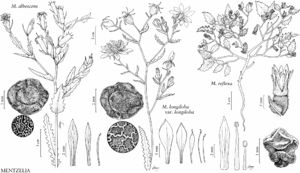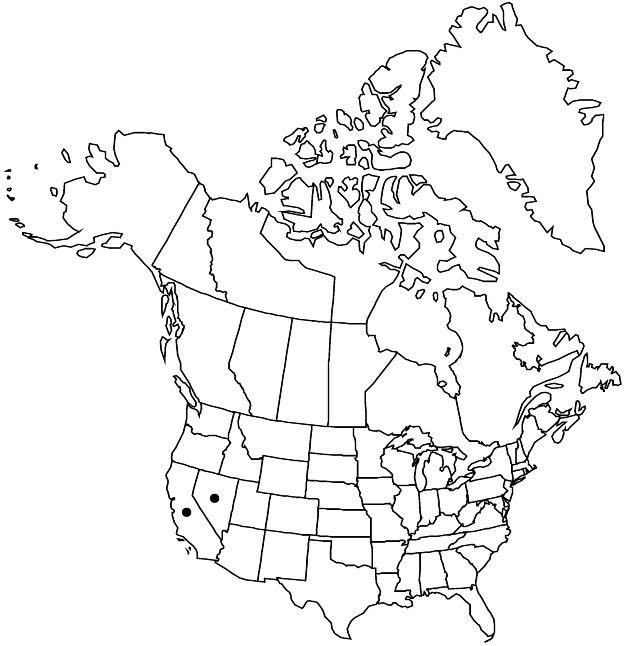Mentzelia reflexa
Proc. Biol. Soc. Wash. 7: 74. 1892.
Plants 2–20 cm. Basal leaves: petioles present; blade oblanceolate to lanceolate, to 10 cm; margins shallowly lobed, lobes rounded. Cauline leaves: petioles usually present, rarely absent; blade broadly ovate to lanceolate, to 10 cm, base not cordate-clasping, margins dentate to serrate. Bracts green, inconspicuous, not concealing pedicel, ovary, or capsule. Flowers: petals pale yellow to white, lanceolate to oblanceolate, 6–12 mm, apex acute; stamens 3–12 mm (fertile 3–8 mm), 1/2 to ± equal petal length, 1–3(–5) outermost staminodial and petaloid (flowers appearing to have 6–8(–10) petals); filaments heteromorphic, 1–3(–5) outermost oblanceolate, inner linear, all unlobed; style 5–6.5 mm. Capsules cylindric to ovoid, 9–13 × 5–7 mm, proximal nodding, distal erect. Seeds constricted and grooved at middle; seed coat anticlinal cell walls straight, obscure. 2n = 20.
Phenology: Flowering Mar–May.
Habitat: Washes, rocky flats, slopes, roadsides, desert scrub.
Elevation: 0–1600 m.
Discussion
Mentzelia reflexa has been placed in other sections, including Octopetaleia Urban & Gilg (I. Urban and E. Gilg 1900) and Bartonia (J. Darlington 1934), due to the presence of three petaloid staminodes, giving an appearance of eight nearly equal petals (specimens subsequently have been found with as few as one and rarely as many as five staminodes). However, G. S. Daniels (1970) placed it in sect. Bicuspidaria based on characteristics including leaf, capsule, and seed shapes, which are very similar to those of M. tricuspis and M. tridentata. Phylogenetic studies subsequently have supported inclusion of M. reflexa in sect. Bicuspidaria (L. Hufford et al. 2003).
Mentzelia reflexa is found in the eastern Mojave Desert.
Selected References
None.

